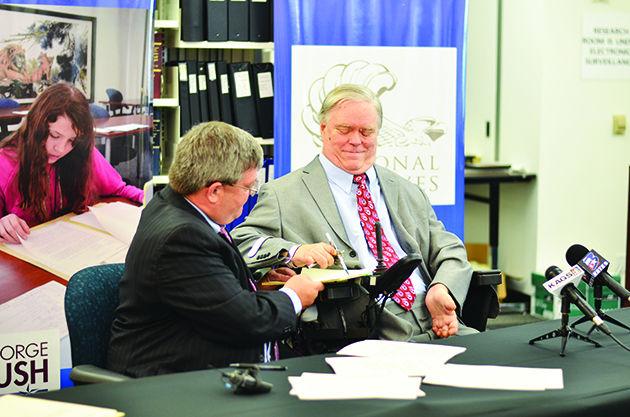Lex Frieden, professor at the University of Texas Health Sceince Center, bequeathed his personal collection of papers and memorabilia related to the Americans with Disabilities Act (ADA), Monday to the George Bush Presidential Library and Museum.
The donation makes the Library the owner of the largest stockpile of documents related to the ADA in the nation, said Robert Holzweiss, supervisory archivist at the Bush Library.
Frieden, who was one of the architects of the Americans with Disabilities Act came into contact with many of these documents through his position as a secretary of the American Coalition of Citizens with Disabilities.
In the early 1980s he recommended that there be legislation to protect disabled U.S. citizens. This proposed legislation drew the attention of then vice-president George Bush. When Bush was elected president, he promised to sign the act into law.
Frieden said he thought it extremely important to donate the documents to the Bush Library in July, as President Bush signed the ADA into law in this month 24 years ago.
Warren Finch, the director of the Bush Library and Meseum, said the importance of Frieden’s collection was compounded by its contents of both personal and official documents.
The Bush Library already possessed a small number of documents related to the ADA, but Frieden’s donation has all but completed the collection, Warren said.
“A collection like Dr. Frieden’s gives us a picture of the ADA and its
advocacy outside of the federal government,” Warren said. “It will help us flesh out the historical record we have here already.”
Frieden’s collection, which is a comprehensive history of the disability advocacy movement prior to the law’s enaction will be available to the public over the next six months to complete the library’s record of the disability movement and to document the difficulties faced by those who are disabled before it was passed.
Prior to the ADA’s passing on July 26, 1990, people with disabilities were frequently discriminated against — there were often university-wide policies across the U.S. forbidding the admission of disabled students, few public transit services had accessible options and career options were limited to a select few jobs, Frieden said.
Frieden said he was even once denied admission based solely on his physical condition, as he is quadriplegic as a result of an automobile accident.
“The ADA has had a profound effect on our society today — people with disabilities simply cannot be discriminated against,” Frieden said. “It’s the law of the land.”
Frieden is currently conducting research into the effects of the law on the social environment of the U.S. His research has found many things incorporated into cities such as wheelchair-accessible buildings, television captions and even the widespread use of Braille.
However, his research has uncovered some challenges still faced by the disabled and U.S. citizens at large — people still face difficulties in finding employment and the increase in the average age of Americans makes it more likely they will have a disability, Frieden said.
Another difficulty faced by the disabled, Frieden said, is many Americans have forgotten the trials they faced prior to 1990 and are slowly forgetting the purpose of such amenities.
“The Americans with Disabilities Act was responsible for a profound re-writing of American society and fortunately or unfortunately, we are slowly beginning to forget why it needed to be passed in the first place,” Frieden said. “Another difficulty we have discovered is the aging of America. Over 10,000 people turn 65 daily, and it is highly likely they will have a disability.”
ADA pioneer visits campus
July 7, 2014
Lex Frieden signs documents that transfer his collection of ADA memorabilia to the Bush Library and Museum.
Photo by Jonathan Sheen
0
Donate to The Battalion
$1865
$5000
Contributed
Our Goal
Your donation will support the student journalists of Texas A&M University - College Station. Your contribution will allow us to purchase equipment and cover our annual website hosting costs, in addition to paying freelance staffers for their work, travel costs for coverage and more!
More to Discover










